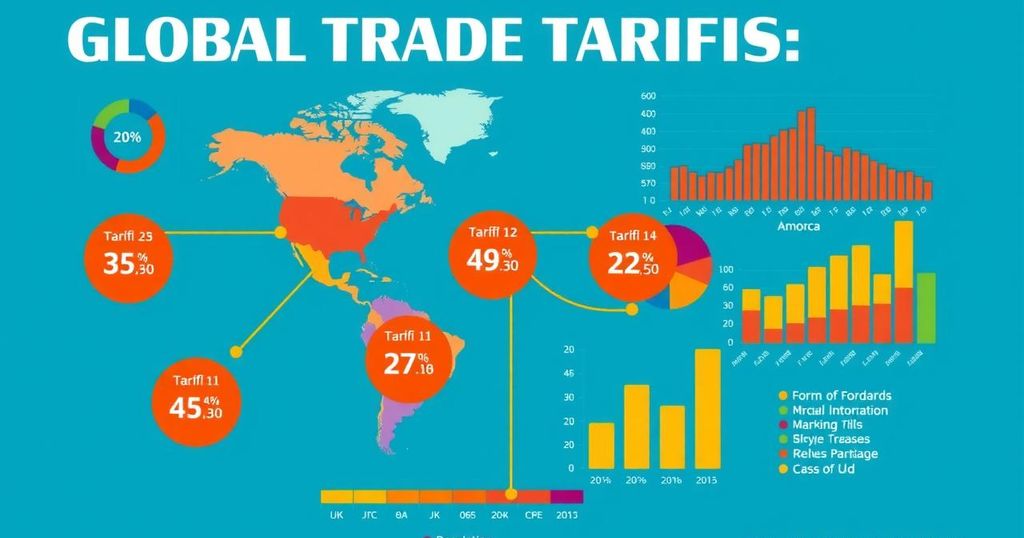President Erdoğan’s imprisonment of Istanbul’s mayor, Ekrem İmamoğlu, signifies Turkey’s further descent into authoritarianism. İmamoğlu, a key political rival, is now eliminated from prospective electoral challenges, illustrating Erdoğan’s intent to suppress dissent. The country’s political journey reflects a systematic removal of democratic institutions and burgeoning parallels to other global authoritarian regimes, presenting a bleak future for Turkish democracy.
Recently, Turkey’s President Recep Tayyip Erdoğan oversaw the imprisonment of Istanbul’s mayor, Ekrem İmamoğlu. This event signifies Erdoğan’s alignment with authoritarian leaders worldwide who suppress political challengers. İmamoğlu, viewed as a strong contender for the 2028 presidential elections, represents a critical point in Turkey’s worsening autocracy. Since its transition to a one-man regime in 2017, Turkey’s electoral processes have provided only a façade of legitimacy.
The elimination of İmamoğlu through judicial means indicates a shift towards an electoral system devoid of substance, akin to systems observed in Belarus, Russia, and Venezuela. Erdoğan’s vision aims to create a unified society aligned with political Islam, silencing dissent effectively. This transformative journey began two decades ago with systematic purges of dissenters, which included prominent military and civilian figures.
During this transformation, Erdoğan initially garnered support from various political factions by presenting himself as a defender against military controls. His legal reforms, particularly those aligning with European Union norms, won him backing from Western governments, allowing him to frame his narrative as one advocating democracy. However, as he consolidated power, he later turned against former allies within the Gülenist movement, initiating widespread purges following the 2013 corruption scandal.
The Gezi Park protests in 2013 marked a critical turning point in Erdoğan’s relationship with opposition forces as he shifted towards a more divisive and repressive political strategy. After being elected president in 2014, he began to ignore legal checks on his authority, exercising power in a manner contrary to the presidency’s legally defined nonpartisan role.
The failed coup attempt in 2016 provided Erdoğan with an opportunity to restructure Turkey’s governmental framework. Following this event, he enacted a widespread overhaul that included firing thousands of officials and judges. Additionally, he targeted the Kurdish political movement, imprisoning leaders like Selahattin Demirtaş, which further illustrated his strategy of stifling dissent.
An alliance with the far-right Nationalist Movement Party (MHP) strengthened Erdoğan’s grip, allowing him to nullify rival political movements. During this period, Turkey distanced itself from the West, notably purchasing military equipment from Russia, reflecting a pivot away from NATO alignment.
In the aftermath of the 2017 referendum, which solidified Erdoğan’s presidential authority, İmamoğlu and Ankara’s mayor, Mansur Yavaş, emerged as significant threats to his dominance. İmamoğlu, in particular, was seen as the most capable challenger for the upcoming 2028 elections. However, his recent removal from the political landscape underscores Erdoğan’s aim to avoid electoral defeat, paralleling tactics observed in other authoritarian regimes.
The implications of İmamoğlu’s imprisonment could extend beyond his removal, threatening secular journalists and artists previously shielded from governmental backlash. The opposition party, led by İmamoğlu and Özgür Özel, might face enhanced marginalization under Erdoğan’s rule, as he pursues an increasingly monolithic Islamic society.
With global politics favoring authoritarian regimes, Erdoğan’s ambitions face minimal resistance. The continual repression of dissent and the erosion of democratic competition in Turkey suggest a grim outlook for the country’s future and a departure from even the pretense of democratic engagement.
The recent imprisonment of Ekrem İmamoğlu marks a significant regression towards authoritarianism in Turkey under President Erdoğan. This act not only eradicates a critical political rival but also signals a broader movement towards eliminating democratic structures. As Erdoğan consolidates power, the prospects for democratic opposition in Turkey diminish, drawing parallels to other autocratic regimes worldwide. The unfolding situation highlights the urgent need for vigilance among global observers as Turkey’s political landscape transforms.
Original Source: jacobin.com




